45, 30, 35, 40, F-25 specifications
Delta 40, F-25, F-30, F-35, and F-45 represent a new generation of aircraft designed to meet the evolving demands of modern aviation. These aircraft are equipped with advanced technologies, making them suitable for various missions, including cargo transport, surveillance, and multirole combat operations. Each model in this series comes with its own set of features and capabilities.The Delta 40 stands as a versatile platform known for its impressive range and payload capacity. Its advanced avionics system ensures enhanced situational awareness and operational efficiency. The aircraft employs composite materials for improved fuel efficiency and reduced maintenance costs. Furthermore, Delta 40 is equipped with state-of-the-art navigation systems that include GPS, inertial navigation, and terrain awareness features.
The F-25 is designed with a focus on agility and speed. It features advanced thrust vectoring technology that allows for greater maneuverability, making it effective in air-to-air combat situations. The aircraft leverages stealth technology, incorporating radar-absorbing materials that reduce its visibility to enemy radar systems. This model also includes advanced electronic warfare capabilities for defensive operations.
Moving on to the F-30, this aircraft serves as a heavy-lift solution, optimized for cargo transport. Its spacious cargo bay can accommodate a wide range of freight, and its loading ramp facilitates quick turnaround times for ground operations. The F-30 utilizes a fly-by-wire control system to enhance stability and control during flight. Additionally, this model is equipped with advanced communication systems that allow for seamless integration into joint operations.
The F-35 integrates cutting-edge technologies to provide multirole capabilities. It boasts an advanced sensor suite that enables real-time data sharing among allied forces. The aircraft's stealth capabilities and advanced electronic warfare systems make it a formidable presence on the battlefield. Its interoperability with various platforms enhances the overall effectiveness of joint missions.
Finally, the F-45 combines the best features of its predecessors and introduces several enhancements. It leverages artificial intelligence for mission planning and execution, streamlining complex operations. The aircraft is also equipped with the latest in propulsion technology, resulting in improved fuel efficiency and performance at high altitudes.
Each of these aircraft models is designed with specific missions in mind, showcasing a commitment to innovation and technological advancement in aviation. With features that enhance their performance, adaptability, and combat readiness, the Delta 40, F-25, F-30, F-35, and F-45 represent the future of aviation technology. Their development signifies an important step toward maintaining technological superiority in both military and commercial aviation sectors.

